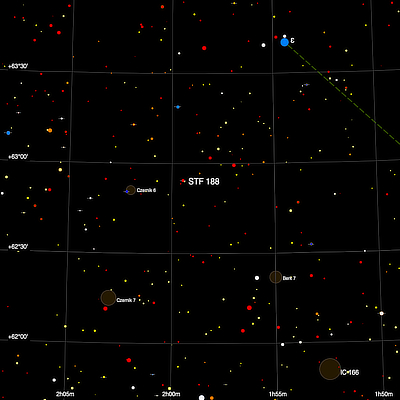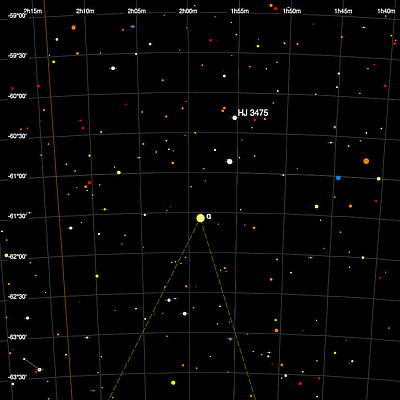November 2025 - Double Star of the Month
Most double stars tend to have components of similar spectral types, or perhaps the difference might span a whole spectral class or two. In STF 188 (01 59 27.53 +62 54 20.6), however, the two main components differ by five spectral classes. The primary is a M0 star which is 2,100 light-years away whilst its B2 neighbour is over 11,000 light-years distant, so this is not a binary star but a line-of-sight coincidence.

The stars lie in Cassiopeia one degree SE of the 3.4 magnitude epsilon Cas, the easternmost star in the 'W' of Cassiopeia. The catalogue visual magnitudes are 9.2 and 10.5 and they are currently separated by 32" in PA 238. Not an easy object for the small aperture but with 20-cm or so the colours of red and white should be apparent. The pair was rejected by Struve and does not appear in the volumes by Dembowski and Lewis.
HJ 3475 (01 55 19.69 -60 18 44.6) lies in Hydrus, about 1.5 degrees NNW of the 2.8 magnitude alpha Hyi. It was swept up by John Herschel on 1836, Oct 3 and he noted it as a fine double star
. Both stars have visual magnitude 7.2 and are currently 2".5 apart in PA 78 degrees. There has been substantial angular motion since Herschel found PA 30 degrees and the components appear to be closing. This appears to be a genuine binary star as Gaia DR3 gives similar parallaxes and proper motions.

A further 1.5 degrees ENE is HJ 3484, which despite the considerable difference in magnitude and substantial separation, also appears to be physically connected. The stars shine at magnitudes 7.6 and 10.5 and are 52" apart in PA 62 degrees. They are 148 light-years distant.
Bob Argyle - Double Star Section Director